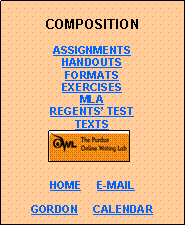|
Composing Strategies Getting Started. Once you have settled on a topic for your paper (see Topic Suggestions, below), scribble anything and everything you can think of concerning the subject. Make lists, freewrite, brainstorm. In other words, generate lots of material to begin with. Later you can cut, shape, revise, and edit. Drafting. Keep in mind your purpose for writing: the ideas and impressions that you want to convey, the particular traits you want to emphasize. Provide specific details that serve to satisfy your purpose. Organizing. Although most of your essay will probably be united by a narrative line (that is, related moment by moment in time), make sure that you complement this narrative (at the beginning, at the end, and/or along the way) with interpretive commentary--your explanations of the meaning of the experience. Keep your readers in mind. This is a "personal" essay in the sense that the information it contains is drawn from your own experience or at least filtered through your own observations. It is not, however, a private essay (that is, one written only for yourself or for close acquaintances). Rather, you are writing for a general audience of intelligent adults--say, your peers in a composition class. The challenge is to write an essay that is not only interesting (vivid, precise, well-constructed) but also intellectually and emotionally inviting. Put simply, you want your readers to identify in some fashion with the people, places, and incidents that you describe. Except when you are deliberately mimicking nonstandard speech in quoted dialogue (and even then, don't overdo it), you should write your essay in correct standard English. You may write to inform, to move, and/or to entertain your readers--but don't write to impress them. Cut out any precious writing, useless adjectives and adverbs, and wordy expressions. Don't waste a lot of time telling how you feel or how you felt; instead, show. Provide the sort of specific details that will invite your readers to respond directly to the experience. Finally, save enough time to proofread carefully. Don't let surface errors distract the reader and undermine your hard work. Following your essay, provide a brief self-evaluation by responding as specifically as you can to these four questions: 1. What part of writing this essay took the most time? 2. What is the most significant difference between your first draft and this final version? 3. What do you think is the best part of your paper, and why? What part of this paper could still be improved? |
